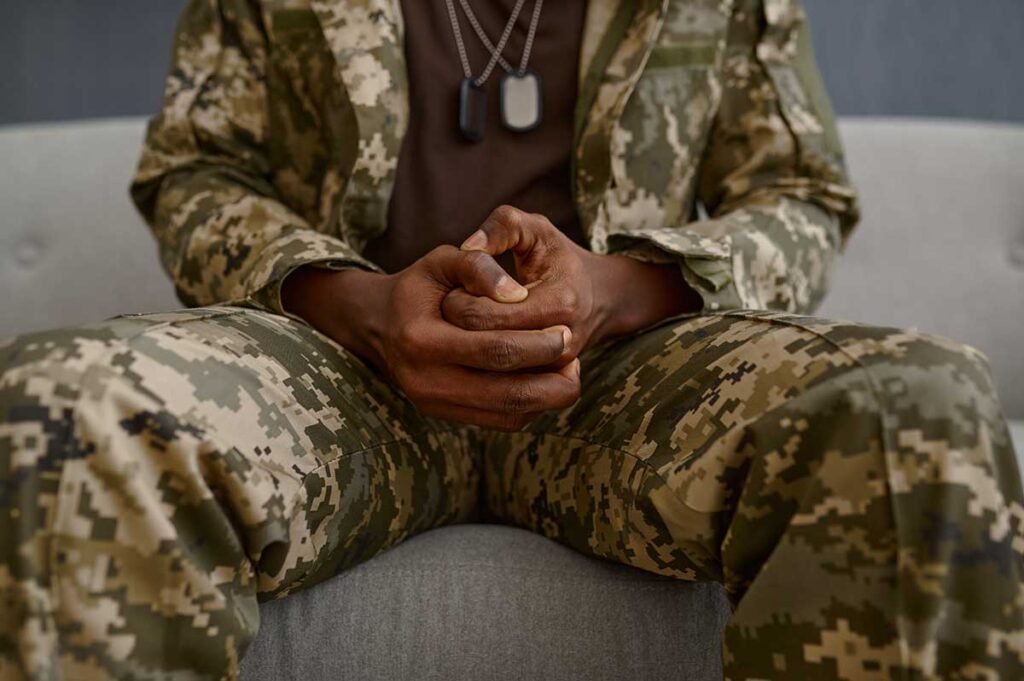Mental health is something we all experience and talk about more these days, and it’s so important to care for it at every stage of life. It’s not something that has a start or end point—it’s a lifelong journey we should nurture and prioritize. As research continues to evolve, more techniques and treatments are uncovered, and even more precise methods of maintaining mental health are found. Mental health care is a crucial aspect of life, and the attention being paid to it will help this trend continue.
Among careers affected by mental health challenges, one group stands out: active military personnel and veterans. The intensity of their experiences often leads to significant mental health struggles. Despite their well-earned reputation for mental and physical resilience, the psychological toll of their service can be profound and deeply impactful.
Returning home after combat can be a daunting transition, and finding trusted techniques for monitoring mental health can be crucial to making that transition as seamless as possible. At Woodland Recovery Center, we believe how crucial this transition period can be and aim to guide those along their journeys through our veteran rehab program. If you or a loved one needs help coping with mental health issues caused by military service, reach out to us today.
Connection Between Service in the Military and Mental Health Problems
The demands of the rigorous schedules faced in the military can bring about stress without combat even being faced. In these scenarios, your mind does its best to shield you from triggers and stressors. The mind has its limits, and when those limits are reached, the strain begins to reveal itself.
Many personnel deal with combat stress, which is a common diagnosis for servicemembers who are beginning to feel the mental pressures of their job. While combat stress is a common diagnosis, and its symptoms may subside shortly after returning home, it still requires the necessary attention.
A few symptoms of combat stress include:
- Depression
- Irritability and outbursts
- Paranoia
- Insomnia
- Headaches
- Loss of appetite
These symptoms, while some may be subtle, could be the flag needed to signal that you or a loved one may be experiencing combat stress. It’s important to know that while combat stress may share symptoms with post-traumatic stress disorder (PTSD), they are two distinctly different conditions and should be treated as such. Sometimes, the connections between the two can lead to confusion about what is present, which is why it’s crucial to speak to a trained professional when ready to begin the journey.
Understanding Veteran and Military Mental Health Issues
The relationship between PTSD and combat stress can make it challenging to distinguish between the two. These similarities can create confusion about which condition is present. A major difference is the fact that PTSD symptoms can persist for a long time, even after leaving combat situations.
These symptoms can cultivate an uncomfortable environment at home because even though you may be safe, your mind being in a heightened state can cause you to feel constantly on edge. While it may not be exclusive to servicemembers, being in those scenarios leaves you all the more vulnerable to mental health damage. Some symptoms equated to PTSD include:
Intrusive Memories
One common symptom of PTSD is intrusive memories, which are when traumatic events are relived long after they occur. Even manifesting as flashbacks, these intrusions can make it difficult to focus on everyday responsibilities. Nightmares may also manifest in a way that causes sleep troubles and restlessness. Real-world triggers, such as specific sounds or locations tied to the trauma, can often spark a surge of intrusive thoughts. This can make it increasingly challenging to reintegrate into daily life.
Mood Changes
Mood changes are another common symptom of those returning from combat situations. Oftentimes, residual fear, guilt, and anxiety can bring about negative self-thinking. These thoughts can lead those experiencing them to believe the world itself has changed for the worse, leaving many with a negative self and worldview, which makes it more difficult to assimilate.
Physical and Emotional Changes
The theme of your mind protecting you is a crucial one to remember. Even when back home, your mind attempts to protect you from things that are perceived as threats. Due to this, hypervigilance or being easily startled are common signs that PTSD may be present. In addition, irritability may also be seen. Also, physical symptoms such as sweating, shaking, and shortness of breath can all be attributed to PTSD.
How Can a Veteran Rehab Help Address Mental Health Issues Caused by Military Service
A veteran rehab can provide specialized care to help address the mental health challenges caused by military service, such as PTSD, anxiety, or depression. These programs create a safe and supportive environment where veterans can work through their emotions and experiences. With access to therapy, peer support groups, and activities that build coping skills, veterans can begin to heal and regain control of their mental health.
Rehab also connects veterans with experts who understand their unique struggles and can guide them toward long-term recovery and growth. Finding the right rehab program can make a significant difference in a veteran’s life and help them move forward from their service experiences.
Contact Woodland Recovery Center and Find Healing at Our Veteran Rehab
Awareness of the complexities involved in returning to life after combat can provide confidence when planning to begin the journey to reassimilation. Spotting and addressing triggers and reinforcing positive thinking can completely change the experience.
If you or someone you care about is ready to begin the journey toward healing from the challenges of military service and improving mental well-being, contact Woodland Recovery Center. Call us directly at 662.222.2989 or complete our online form to take the first step.



